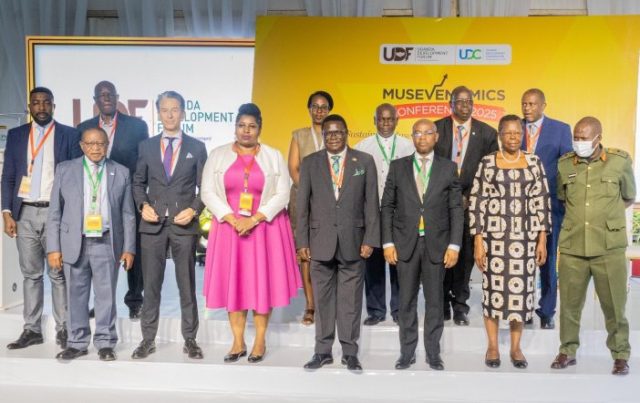A two-day event, ‘the Musevenomics Conference 2025’, has today commenced at the Mestil Hotel in Kampala, and has attracted policymakers, economists and business leaders to shape Uganda’s economic future.
The event organized by the Uganda Development Forum and partners is being held under the theme “Sustaining Musevenomics: Navigating Uganda’s Economic Future in a Disrupted World,” aimed at dissecting President Yoweri Kaguta Museveni’s economic philosophy, aiming to align it with Uganda’s Vision 2040 and the National Development Plan IV.
The event seeks to deliver actionable policy recommendations for sustainable development with sessions on industrialization, value addition and inclusive growth.
The opening session was chaired by Deputy Governor of the Bank of Uganda, Prof Augustus Nuwagaba and featured the Minister of Finance Planning and Economic Development Hon Matia Kasaija and Uhanda Development Forum chairperson Gen Caleb Akandwanaho Salim Saleh.
The Director of the Economic Forum at Makerere University Business School, Dr Fred Muhumuza delivered a keynote address tracing President Museveni’s 10-Point Programme, highlighting its focus on education, agriculture and security since 1986.
Dr Muhumuza pointed out that Musevenomics is pragmatic, people-centered growth and emphasized its role in Uganda’s transformation from a low-income to a middle-income economy.
Today’s exposure explored Uganda’s economic opportunities, including booming coffee and gold exports, rising remittances, and oil sector investments and the speakers also tackled challenges like regional instability, global trade disruptions and declining foreign aid.
Gen Salim Saleh spotted out the Parish Development Model (PDM), noting that by April 2025, Uganda’s 10,595 parishes received Ugx 200 million each for agriculture and animal husbandry which has fostered a monetized rural economy.
“This is Musevenomics at work—empowering communities and this is linked it to Vision 2040’s middle-income goal” Gen Salim Saleh expounded.
According to the organisers, the conference’s impact lies in its ability to bridge policy and practice and discussions on industrialization highlighted Uganda’s stable macroeconomic conditions and UPDF-led infrastructure projects, such as roads and schools, aligning with Musevenomics’ globalized vision.
A discussant, Dr Patrick Birungi emphasized value addition in agriculture, noting that coffee exports have nearly doubled since 2019 but more effort is needed.
Private sector participants, like Kampala entrepreneur Ms Sarah Nakimuli, praised the platform’s collaborative spirit saying that it is where they align businesses with national goals.
During the conference, a digital display of Musevenomics successes from rural electrification to agro-processing hubs were showcased while panels addressed global disruptions like supply chain issues and health threats, including HIV/AIDS and Ebola.
The conference aims to deepen understanding of Musevenomics, assess its relevance in a volatile global economy and develop a roadmap for socio-economic transformation.
The Organizers are committed to sharing comprehensive session documentation within two weeks and publish a scholarly analysis of Musevenomics’ applications across sectors. President Yoweri Kaguta Museveni will deliver the closing keynote tomorrow and is expected to outline bold policy directions.
By convening Uganda’s top minds, the Musevenomics Conference at Mestil Hotel is more than a policy forum and it’s a catalyst for innovation as Uganda navigates global economic challenges, the event underscores the NRM’s vision for a prosperous, self-reliant nation, setting the stage for impactful policies ahead of the 2026 elections.








